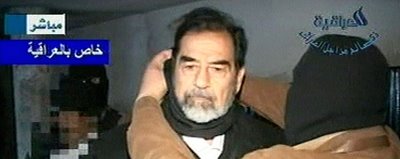
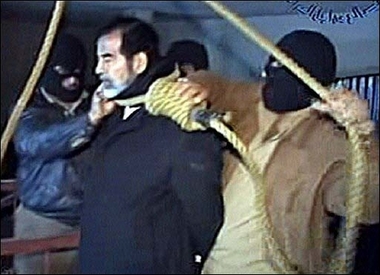
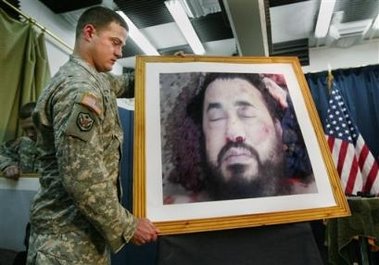

The news brought joy in Shiite areas of the capital. Iraqi police in the Shiite slum of Sadr City fired weapons in the air and chanted.
Ali Mustafa, a 31-year-old Shiite, said Zarqawi's death filled him with "extreme happiness." -- USA Today
Complete Coverage of Zarqawi's DeathIraqi soldiers hold up their weapons as they celebrate the death of al Qaeda's leader in Iraq, Abu Musab al-Zarqawi, in Najaf, June 8, 2006.
 June 8: Iraqi soldiers celebrate the news that Abu Musab al-Zarqawi is dead.
June 8: Iraqi soldiers celebrate the news that Abu Musab al-Zarqawi is dead. June 8: Iraqi police officers, elderly woman fire guns in the air to celebrate the news that Abu Musab al-Zarqawi death.
June 8: Iraqi police officers, elderly woman fire guns in the air to celebrate the news that Abu Musab al-Zarqawi death.






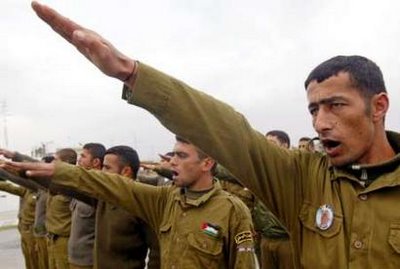 'Palestinian' security forces salute during a training session in the West Bank city of Tulkarm February 1st, 2005. REUTERS/Abed Omar Qusini
'Palestinian' security forces salute during a training session in the West Bank city of Tulkarm February 1st, 2005. REUTERS/Abed Omar Qusini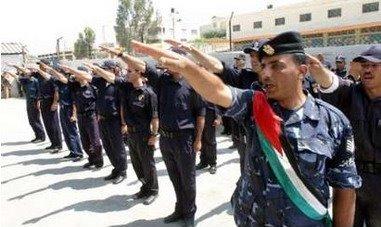 Palestinian police officers salute during a graduation ceremony in the West Bank town of Jenin May 9, 2006. REUTERS/Mohamad Torokman
Palestinian police officers salute during a graduation ceremony in the West Bank town of Jenin May 9, 2006. REUTERS/Mohamad TorokmanInterviewer: I have heard voices from within the Palestinian Authority in the past few weeks, saying that the reforms are coordinated according to American whims...
Arafat: We are not Afghanistan. We are the mighty people. Were they able to replace our hero Hajj Amin al-Husseini?... There were a number of attempts to get rid of Hajj Amin, whom they considered an ally of the Nazis. But even so, he lived in Cairo, and participated in the 1948 war, and I was one of his troops."
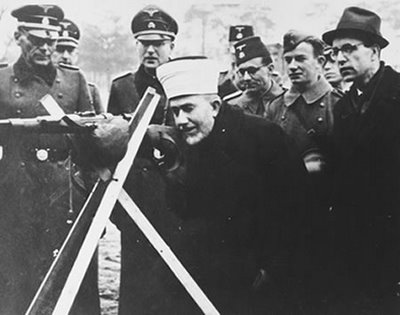
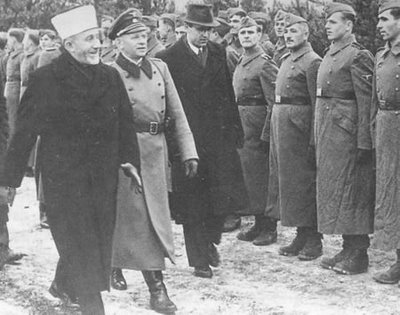
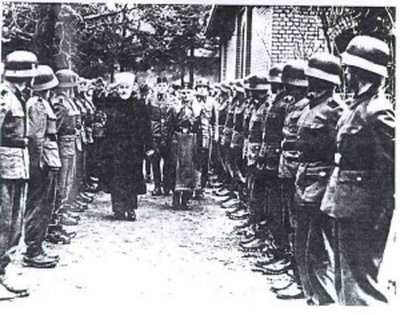


YASSER ARAFAT died at age 75, lying in bed surrounded by familiar faces. He left this world peacefully, unlike the thousands of victims he sent to early graves.In a better world, the PLO chief would have met his end on a gallows, hanged for mass murder much as the Nazi chiefs were hanged at Nuremberg. In a better world, the French president would not have paid a visit to the bedside of such a monster. In a better world, George Bush would not have said, on hearing the first reports that Arafat had died, "God bless his soul." God bless his soul? What a grotesque idea! Bless the soul of the man who brought modern terrorism to the world? Who sent his agents to slaughter athletes at the Olympics, blow airliners out of the sky, bomb schools and pizzerias, machine-gun passengers in airline terminals? Who lied, cheated, and stole without compunction? Who inculcated the vilest culture of Jew-hatred since the Third Reich? Human beings might stoop to bless a creature so evil -- as indeed Arafat was blessed, with money, deference, even a Nobel Prize -- but God, I am quite sure, will damn him for eternity.
Arafat always inspired flights of nonsense from Western journalists, and his last two weeks were no exception.Derek Brown wrote in The Guardian that Arafat's "undisputed courage as a guerrilla leader" was exceeded only "by his extraordinary courage" as a peace negotiator. But it is an odd kind of courage that expresses itself in shooting unarmed victims -- or in signing peace accords and then flagrantly violating their terms.
Another commentator, columnist Gwynne Dyer, asked, "So what did Arafat do right?" The answer: He drew worldwide attention to the Palestinian cause, "for the most part by successful acts of terror." In other words, butchering innocent human beings was "right," since it served an ulterior political motive. No doubt that thought brings daily comfort to all those who were forced to bury a child, parent, or spouse because of Arafat's "successful" terrorism.
Some journalists couldn't wait for Arafat's actual death to begin weeping for him. Take the BBC's Barbara Plett, who burst into tears on the day he was airlifted out of the West Bank. "When the helicopter carrying the frail old man rose above his ruined compound," Plett reported from Ramallah, "I started to cry." Normal people don't weep for brutal murderers, but Plett made it clear that her empathy for Arafat -- whom she praised as "a symbol of Palestinian unity, steadfastness, and resistance" -- was heartfelt:
"I remember well when the Israelis re-conquered the West Bank more than two years ago, how they drove their tanks and bulldozers into Mr. Arafat's headquarters, trapping him in a few rooms, and throwing a military curtain around Ramallah. I remember how Palestinians admired his refusal to flee under fire. They told me: `Our leader is sharing our pain, we are all under the same siege.' And so was I." Such is the state of journalism at the BBC, whose reporters do not seem to have any trouble reporting, dry-eyed, on the plight of Arafat's victims. (That is, when they mention them -- which Plett's teary bon voyage to Arafat did not.)
And what about those victims? Why were they scarcely remembered in this Arafat death watch?
How is it possible to reflect on Arafat's most enduring legacy -- the rise of modern terrorism -- without recalling the legions of men, women, and children whose lives he and his followers destroyed? If Osama bin Laden were on his deathbed, would we neglect to mention all those he murdered on 9/11?
It would take an encyclopedia to catalog all of the evil Arafat committed. But that is no excuse for not trying to recall at least some of it.
Perhaps his signal contribution to the practice of political terror was the introduction of warfare against children. On one black date in May 1974, three PLO terrorists slipped from Lebanon into the northern Israeli town of Ma'alot. They murdered two parents and a child whom they found at home, then seized a local school, taking more than 100 boys and girls hostage and threatening to kill them unless a number of imprisoned terrorists were released. When Israeli troops attempted a rescue, the terrorists exploded hand grenades and opened fire on the students. By the time the horror ended, 25 people were dead; 21 of them were children.
Thirty years later, no one speaks of Ma'alot anymore. The dead children have been forgotten. Everyone knows Arafat's name, but who ever recalls the names of his victims?
So let us recall them: Ilana Turgeman. Rachel Aputa. Yocheved Mazoz. Sarah Ben-Shim'on. Yona Sabag. Yafa Cohen. Shoshana Cohen. Michal Sitrok. Malka Amrosy. Aviva Saada. Yocheved Diyi. Yaakov Levi. Yaakov Kabla. Rina Cohen. Ilana Ne'eman. Sarah Madar. Tamar Dahan. Sarah Soper. Lili Morad. David Madar. Yehudit Madar. The 21 dead children of Ma'alot -- 21 of the thousands of who died at Arafat's command.
© Copyright 2004 Globe Newspaper Company.